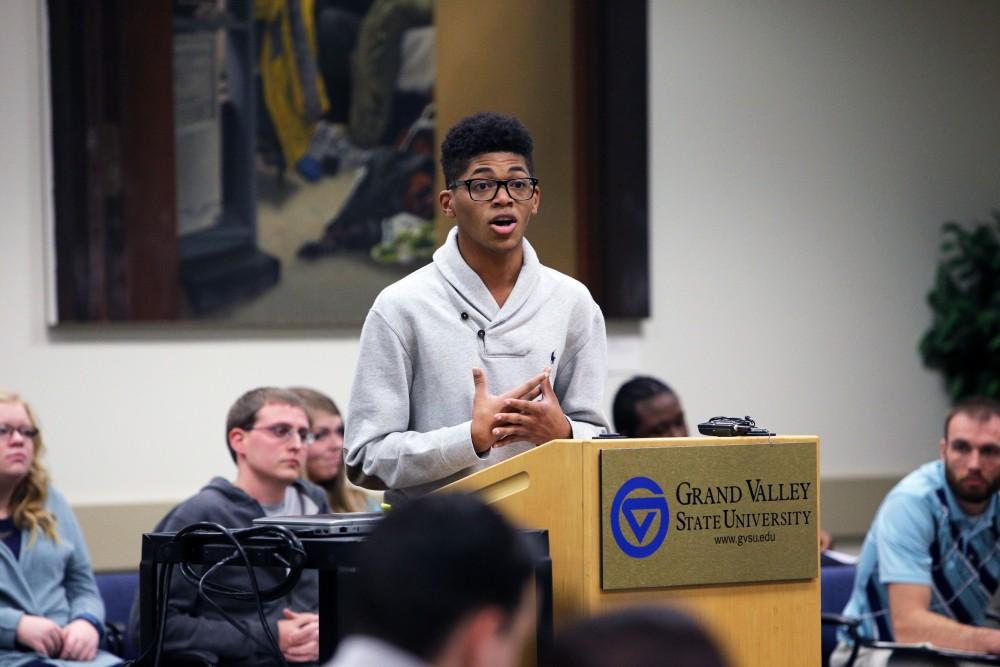Student senate shoots down ‘Good Samaritan’ resolution

GVL / Emily Frye Former student senate senator Terrell Couch takes the opportunity to address the senate about the highly debated firearm proposal on Nov. 19th.
Nov 23, 2015
Tensions and emotions ran high as the much-anticipated Good Samaritan resolution was voted on during Thursday’s student senate meeting. With a 39-3 vote (with two abstentions), senators voted down the resolution, and Grand Valley State University will remain a completely gun-free campus for another year.
Two main points that popped up throughout the three-week discussion were the lack of definition for ‘emergency,’ and the wording which implied undermining the GVSU student code. Many senators cited these things as reasons they could not vote in favor for the resolution.
The resolution, written by senator Benjamin Soltis, looked to “incorporate a Good Samaritan in the Student Code to allow legally carried firearms on campus to be used in case of an emergency.” The resolution confused not only the student senators, but also by students, faculty and staff that they have talked with about it.
“This issue is for a legalized carry of firearms in an emergency situation,” Soltis said.
Both Vice President for Finance Jeremy Turnbull and Vice President for Campus Affairs Sean O’Melia have insisted that writing a resolution that undercuts the student code is wrong and should be rewritten.
“”We can change the student code and I think we should rather go that route rather than write a resolution overriding the student code,” O’Melia said. “We should not override student code unless we’re 100 percent sure because it demeans and diminishes every single resolution we have.”
Turnbull offered his assistance to Soltis, saying he would help him work on a revised resolution that would not mention undermining student code or firearms.
Senator Noelle Milad also voiced her concern for the resolution because of the lack of training concealed pistol license (CPL) carriers receive.
“In the (resolution), the pistol license safety training course application process shows many guidelines, but not one of them says that CPL holders get trained in assessing a life-threatening situation,” Milad explained. “However, in the Michigan Commission on Law Enforcement standards, it explicitly says (police officials) get trained in assessing a life-threatening situation.”
Soltis countered previous statements by stating that CPL holders do have to re-certify every three to five years. He did, however, agree with Milad.
“Police officers are much more trained in those situations than we are,” he said.
Senator Kristoffer Butler talked to four of his six classes about the resolution. Of the 73 people he asked, 53 were not in favor of the resolution, 10 were in favor and 10 were undecided. Many senators echoed that a problem of the resolution was the confusing and conflicting language used.
Vice President for External Relations Andy Oeffner personally opposed the resolution, but he proposed having a different resolution that focuses on the real problem at hand: mental health.
“During public comment a week ago, it was brought up that this is a mental health problem,” Oeffner said. “I believe that we should counter this with a mental-health resolution and focus more on that as a proactive solution.”
Unlike the majority of the senators who voiced their opposition to the resolution, almost half of the people who spoke during public comment were in favor of passing it. They asked the body to consider the facts about guns and guns on campus.
“Emotions run high when we talk about (guns) but more so than emotion is irrational fear,” said public comment speaker Keith Eichholz. “If you let your irrational fear or emotions dictate how you feel, you’re going to stop listening to the debate and you’re going to institute policy based on sheer emotion.”
Fear was a large topic for the people who were for the resolution. Many asked the senators not to base their decision around fear, as it was not a good basis for doing so.
Soltis, while unhappy with the outcome, said he is contemplating the comments he received for revision.
“I’m thinking about (revisions),” he said. “I’m considering making it less lethal and not using such a broad brush.”





















